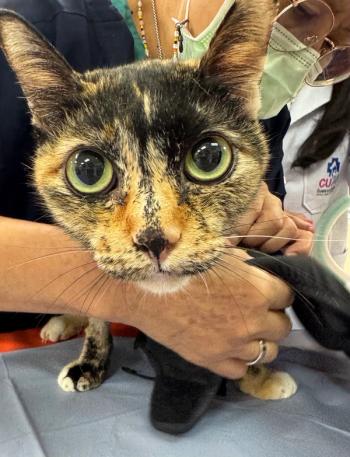
Research Updates: Can pH analysis help determine the cause of pericardial effusion?
Neoplastic and idiopathic pericarditis are common causes of pericardial effusion, a highly morbid condition.
In this clinical study, 42 dogs with neoplastic or idiopathic pericardial effusion underwent pH analysis of pericardial fluid within one hour of pericardiocentesis. Twelve dogs (29%) had idiopathic pericarditis based on histopathologic examination of the pericardium, absence of an intrapericardial mass, and no recurrence of effusion for at least six months after initial pericardiocentesis treatment. Twenty-five dogs (60%) had neoplastic pericardial effusion based on histopathologic examination of a mass or detection by ultrasonography of a heart-associated tumor. The mean age of the dogs was 8.8 years for the idiopathic group and 9.8 years for the neoplastic group.
The results of pH analysis revealed no significant difference in the median pH of pericardial effusion fluid from the idiopathic group (7.4) and the median pH of fluid from the neoplastic group (7.47). Furthermore, data from the two groups overlapped in 89% of the cases. The authors concluded that pH analysis alone cannot differentiate neoplastic from idiopathic causes of pericardial effusion.
COMMENTARY
Neoplastic and idiopathic pericarditis are common causes of pericardial effusion, a highly morbid condition. Neoplastic lesions portend a poor prognosis, while idiopathic effusions are responsive to pericardiocentesis or pericardiectomy. Ultrasonography and histopathology are critical diagnostic tests; pH analysis of fluid has been described previously as a useful tool in people and animals. Although the technique described in this article is technically easy, its validity as a diagnostic tool is unfortunately limited. Differences in methodologies make comparisons with contradictory studies somewhat difficult. Physical and ultrasonographic examinations may remain the best noninvasive diagnostic tests to date for differentiating between neoplastic and idiopathic pericardial effusion.
Fine, D.M. et al.: Use of pericardial fluid pH to distinguish between idiopathic and neoplastic effusions. J. Vet. Intern. Med. 17 (4):525-529; 2003.
Newsletter
From exam room tips to practice management insights, get trusted veterinary news delivered straight to your inbox—subscribe to dvm360.






